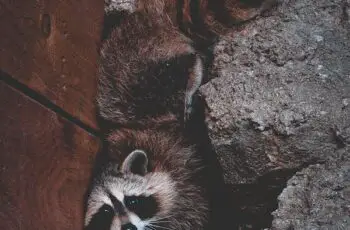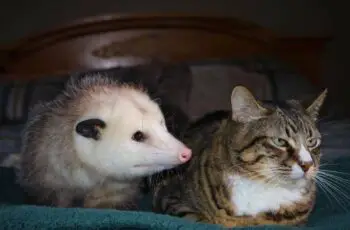Have you seen a pregnant, injured, or sick raccoon from a close distance? If the answer is yes, it means that you probably have experience with raccoon attacks. Raccoons will consume songbirds, ducks, chickens, and eggs. They’ll eat moles, rats, mice, frogs, shrews, and rabbits. When fruit ripens, they’ll eat nearly anything, and they also like eating garbage. Raccoons are charming, inquisitive, and clever small animals that get along well with people. Today, you will learn how to protect yourself from a raccoon’s attack.
How to protect yourself from raccoons attack
A very basic way to protect yourself from a raccoon’s attack is to scream at the raccoon, clap your hands, and move in its direction. This should be sufficient to make it flee. To effectively remind raccoons that you are a dangerous predator, you may also use an airhorn, smash a pot, throw tennis balls in its direction, or use a hose spray. You may need to be quite loud and noisy to scare off raccoons who are accustomed to human feeding, but they should still respond. There could be an issue if you’ve tried all of these methods and the raccoon is unresponsive, doesn’t even glance up at you, or doesn’t make an attempt to flee. Seek guidance from a wildlife rehabilitator.
To identify raccoon attacks, you need to figure out raccoon types to help you better predict raccoon attacks. Raccoons come in a variety of varieties that you may come upon. The most prevalent raccoon in North America is the Procyon lotor, sometimes known as the Northern Raccoon. However, we also have the Upper Mississippi Valley Raccoon, Mexican Raccoon, and Eastern Raccoon. Though raccoons are known in three types, it is insufficient to distinguish them merely by name.
Types of raccoons’ attacks
Why is there a perception that raccoons are dangerous? Because of the way they act, raccoons can be terrifying while trying to escape dangerous circumstances. Most of the time, though, they have no intention of holding their ground. Occasionally, they will abruptly leap forward in a hostile manner before retreating away. But because of their excellent acting, many people mistakenly believe that a raccoon is going to attack them when, in reality, it just wants to cause trouble and make a way out. It is extremely difficult to understand raccoon attacks and their assault time at all. Four typical ways that a raccoon might attack are as follows:
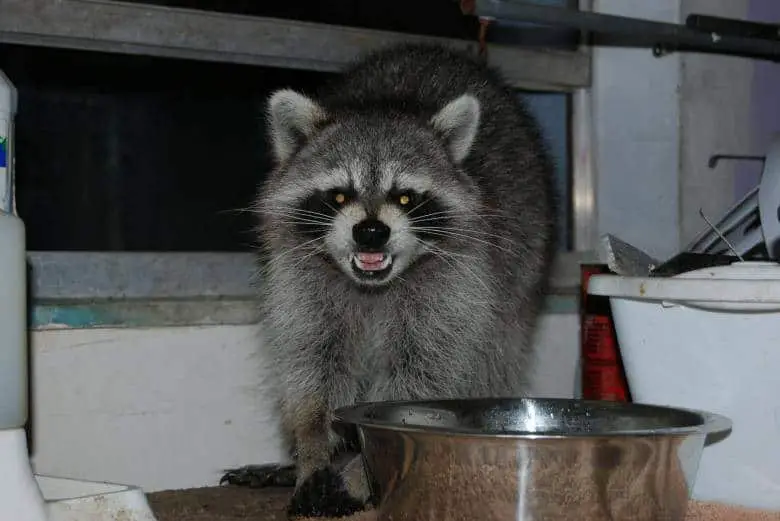
1. Instinctive Raccoons Attack
startling a raccoon can potentially prompt an instinctive assault. For instance, if a raccoon is encamped directly at your door, opening it could lead to the raccoon attacking if it senses that it is cornered. It’s interesting to note that when raccoons are cornered, they may attack or run away.
2. raccoons Behavirou reflection Attack:
Physical maltreatment during their development may have influenced their hostility toward people. Regretfully, some people treat raccoons badly because they view them as pests. Aggression can be induced in people by their actions. Avoid approaching raccoons in an aggressive manner, and avoid throwing things at them. Most of all, raccoons are wild animals, and what they want is to be alone.
3. Mother raccoons Attack for Protection:
Ultimately, a mother raccoon’s top priority is safeguarding her young. They are incredibly amazing and wise animals who have repeatedly astounded us with their power and devotion to their young. If you see a bunch of raccoons with their mother, give them enough space. It’s easy to provoke a raccoon mother’s aggressiveness by approaching her young or by getting in the way of her offspring.
4. Sickness raccoons Attack
The most alarming scenario involves a sick raccoon. Like any other rabies-affected animal, a raccoon’s symptoms are unpredictable. In this scenario, raccoon behavior will radically alter. Any animal would typically be afraid of people, but rabies-stricken animals would appear to have no fear at all. Among the telltale signs of rabies are twitchy heads, following fictitious or flying objects, attacking stationary objects, and spitting foam. It’s likely that your attempts to shoo them away will fail. Prioritize your safety above everything else; approaching these animals might be harmful in this situation. Seek out expert assistance right away.
How to protect your car from raccoons attack
Are you sick of raccoons causing havoc and searching through your car? Then you’re not by yourself! Fortunately, there are a few things you can do to deter raccoons from getting near your car. Continue reading for our best advice on keeping raccoons out of your automobile.
1. Use Peppermint Oil
One of the best ways to keep raccoons away from your automobile is to use peppermint oil. The potent smell of this natural repellant seems to turn raccoons off. You can use this characteristic to your advantage by employing scents people find repulsive, such as hot pepper, onion, garlic, peppermint oil, and Epsom salt. To make peppermint spray, fill an empty bottle with four to five drops of essential oil and a small amount of rubbing alcohol. Then, add water. Apply the spray close to the car’s exterior, where raccoons might be coming or going. To deter these unwanted creatures from living in your automobile, you can also sprinkle peppermint oil on the area surrounding it.
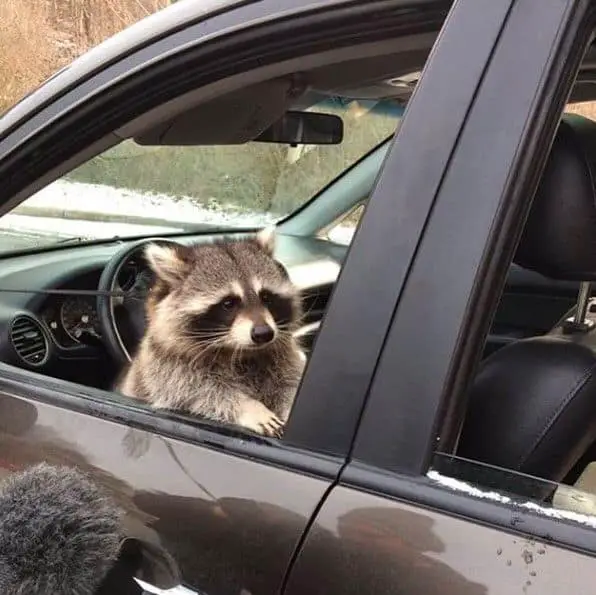
2. Try Home Remedies
Raccoons might be deterred from approaching your car by using natural solutions. Blood meal, vinegar, crushed garlic, powdered cayenne pepper, ammonia, and used cat litter are all useful deterrents for raccoons. To keep them away from your automobile, scatter these all-natural repellents in strategic locations like the wheel wells and tires. Another way to manufacture pepper spray is to combine ground or powdered pepper (jalapeño or cayenne work well) with water, then apply the mixture all over the outside of your automobile. Because they detest the taste and smell of spicy peppers, raccoons will avoid areas where the spray has been used.
3. Hang a Bag of Mothballs
If you want to keep raccoons away from your automobile, hang a bag of mothballs. Mothballs have long been added to natural fibers as an insect and pest deterrent. Mothballs emit a strong odor that dissuades most animals, including raccoons. Fill a small net bag with mothballs and hang it under the hood of your car to keep raccoons away. Be sure it is firmly fastened to prevent it from falling off, and be sure to verify that it is still in place on a frequent basis. Raccoons can be discouraged from approaching your car by using mothballs, protecting both you and your car from intruders.
4. Place Other Smell-Emitting Items
Putting additional smell-emitting objects near your car is another good strategy to deter raccoons from approaching it. Scent-based deterrents available in stores, like peppermint oil, can keep raccoons away from the area. Alternatively, you can apply DIY solutions to the wheel wells of your car, such as vinegar and used cat litter. Rags can be soaked in ammonia and placed in locations where raccoons are frequently spotted. This will lessen the likelihood that they will go back to your automobile. To keep them away, you can also hang a string of garlic cloves around the location.
5. Make a Noise
One of the easiest ways to deter raccoons from coming near your automobile is to make noise. Raccoons are startled and fearful when they hear pots and pans clanging, pounding, or hitting them with a wooden spoon. Other objects, like an antique wind chime or a shake-can full of stones or pebbles, can also be used to produce noise. Alternatively, you may install motion-activated sprinklers that, upon sensing the presence of a raccoon, will make a loud noise. You can deter raccoons and prevent potential damage to your car by creating noise.
- What does a raccoon’s stool look like? (+Pictures)
- Why are raccoons so destructive? Keep Raccoons Away?
- What’s New in iOS 17? 17 New Features of iOS 17?
How do you protect your yard from raccoons attacks?
Raccoons are using your yard as a source of food, drink, and/or cover. What distinguishes a raccoon problem from one that is just passing through your yard? You have a raccoon problem when you start to notice damage or witness signs of raccoon activity regularly. Raccoons are primarily found in woodland regions near bodies of water. Raccoons naturally make their dens in hollow trees. However, they have adjusted to living in rural, suburban, and urban settings. Raccoons will make their dens beneath decks or porches, inside sheds, in chimneys, or your attic. To stop or prevent raccoons from breaking into your yards, keep in mind these steps.
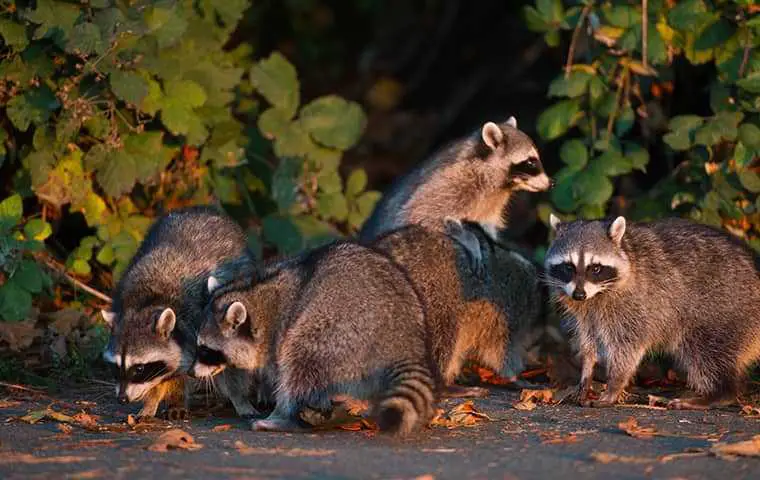
1. Get rid of white grubs
The white grub—a tiny, rust-colored larva that raccoons adore—is the main cause of their lawn-eating infractions. Often called June beetles, they are soil-dwelling insects that go through a complete year of existence. Raccoons love those large, juicy autumn grubs, which are available from September to November. Crows, skunks, and moles are among the other species that consume these grubs; thus, it is mostly they that cause any damage to your grass when they dig up leaves. First things first, get rid of the grubs. Predatory nematodes are a natural option that you can buy online, dilute in water, and spray into the soil. Another option is milky spore, which is a fungal infection that kills the grubs. However, there are conflicting reports about the effectiveness of these natural products, and applying them is costly and sometimes ineffective. Treating grubs should be done in the spring, summer, and fall.
2. Exclude the raccoons.
If you need a fast fix and have a lot of raccoon damage, put down fencing on your lawn to keep the critters out. Get a large roll of plastic-coated chicken wire or orange snow fencing from your neighborhood home improvement store. Large rectangles of fencing should be laid across your lawn, and it should be secured with” landscaping staples. This will prevent raccoons from digging in your yard and allow air, water, and sunlight to reach your lawn. This will eventually force them to relocate. This may be a good solution for homes with modest lawns and typical city lots, but it is not a cost-effective strategy for homes with large yards and greenery.
3. Consult a professional.
If you don’t feel comfortable dealing with grubs on your own, hire a professional. Should the issue lie elsewhere, a qualified team may address additional concerns that may be attracting raccoons to your yard. Experts may provide helpful performance tips, depending on the circumstances. How do wildlife removal experts get rid of raccoons?
How to protect your pet (cat or dog) from raccoons attack
Raccoons may choose to feed on smaller animals, like cats and dogs if they have no other food sources available to them. Even though they could have trouble capturing larger cats, they are successful in their prey-on-kitten operations. Raccoons and dogs can occasionally be seen eating together, particularly when the owners of the dogs and cats are feeding them outside. Consequently, the main reason you might see your pets interacting with raccoons is if you feed them outside.

Dogs may even attack raccoons, while cats will not harm them; in fact, dogs may even attack newborn raccoons who have recently become orphans. To protect them from raccoon attacks, it is preferable to keep cats home throughout the night, especially the younger kittens. Most raccoons will kill cats for sports, even if larger cats have a good sense to steer clear of the raccoons, but the hunting skills of the raccoons make them so fast. Sometimes, raccoons will scratch a dog’s or cat’s eyes with their claws before snapping their teeth at them very quickly. The raccoon then proceeds to eviscerate its victim by biting the dog’s or cat’s chest walls. This can cause the victim to suffer a severe shock that could induce kidney failure.
Raccoons do preserve their predating personalities when cats and dogs are willing to share their food; however, when a raccoon meets an aggressive cat, then there may be a clash of personalities. Although larger and more aggressive canines can be very difficult for raccoons to attack, smaller kittens appear to be their main target; even chickens and turkeys are not immune to raccoon attacks. The greatest conceivable approach to safeguarding your pets from raccoons is to feed them indoors.
Are raccoons dangerous enough to kill you?
Raccoons’ attractiveness can sometimes be the cause of an assault. They resemble exotic pets and may even behave like one. If you feed them, they will approach you and eat food directly from your hands without causing any harm. However, feeding raccoons is not a good idea since they will strike out if they feel threatened. Raccoons, like all other animal species, have a fight-or-flight instinct. If a raccoon perceives a threat, it will scratch or bite. Most assaults occur when a mother raccoon perceives a threat to her young and takes action to defend them. Though a raccoon may look friendly, always approach the animal with care.
How do raccoons attack?
Raccoons are nimble and perceptive creatures. They are capable of causing great injury and have fangs and claws that are sharp. A raccoon may leap and bite someone if they are in its mouth. They can swiftly kill animals thanks to their keen teeth, which help them in hunting. Biting someone is equivalent to this. Human skin can be shredded by raccoon teeth like butter, leaving a painful cut in its wake. Those who were bitten by raccoons frequently required stitches.
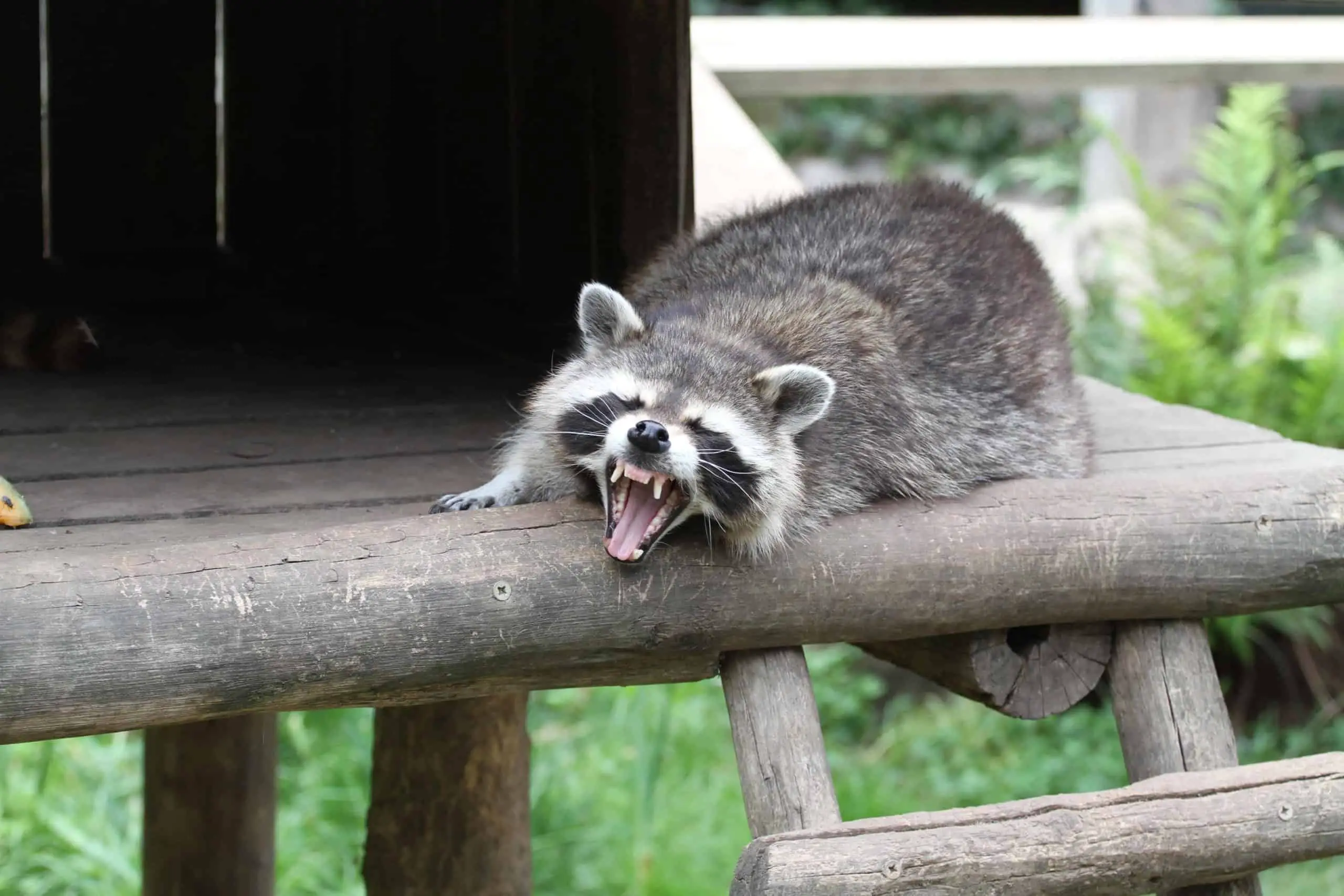
raccoons attack
The animal is renowned for possessing claws like human hands. While it could be entertaining to see a raccoon snatch something like humans, it might not be as entertaining when the animal is scratching you with its claws. A raccoon can quickly scratch you due to their agile nature. Stay away from raccoons that are growling in order to avoid getting bitten or scratched.
What happens if a raccoon bites?
Even though a raccoon’s bite or scratch might not be fatal, the illnesses it carries can. Like any other wildlife, raccoons are susceptible to diseases that are invisible to humans. Raccoons can transmit diseases to people, such as roundworm, leptospirosis, and rabies. Raccoons are regarded as a primary vector of the rabies virus in the United States, along with foxes, skunks, and bats. Although any warm-blooded mammal can carry rabies, raccoons are sometimes referred to as the “vector species of rabies.”1 A bacterium called leptospirosis can infect rabbits, rats, opossums, skunks, raccoons, and white-tailed deer. An individual can contract leptospirosis by being bitten or scratched by a raccoon carrying the germs.
Action to be taken when bitten by raccoon
After five minutes, at the very least, clean the wound with soap and water. See a physician as soon as you can so that they can assess whether you require additional care. Make contact with the animal control officer in your community. Keep an eye out for signs of rabies or other illnesses if the animal that bit you is close to you. The raccoon will be killed so that it may be examined for rabies after the animal control officer tries to trap it.
How to outsmart a raccoon
It is never ideal to have a raccoon on your property. Despite their adorable appearance, the creatures frequently enter homes in search of a warm spot to rear their young. In addition to spreading harmful infections through their feces, raccoons can become aggressive when they feel threatened. For the sake of your family’s health, you should keep them out of your house. Help is available from Skedaddle Humane Wildlife Control. In addition to removing raccoons from your property, we can assist you in making it less enticing to them. Here are four pointers to get you going.

Install a Chimney Cap
Installing a chimney cap while using your fireplace is one of the easiest ways to prevent raccoons from entering your chimney. If chimneys are covered, raccoons are unable to utilize them as access locations. Additionally, you should use wire mesh or steel wool to seal any gaps and fractures outside your house. Raccoons are incredibly nimble and can quickly claw at tiny holes to make them big enough to fit through, even if you believe a hole is too small for them to fit through.
Avoid Leaving Food Outside
Don’t put pet food out for cats and dogs who are left outside. Instead, establish a feeding regimen. Locking the lid on your garbage cans is another way to keep them secure. If you have hens, make sure your coop is predator-proof and secure your vegetable gardens with a strong fence. You should also try your best to gather eggs daily. Raccoons are more likely to go on to another area if you make them work for their food.
- Related: How to help an injured raccoon?
Food is the primary magnet for raccoons. From fish and berries in the woods to chicken eggs and food scraps in cities, the masked bandits consume a wide range of foods. Raccoons will settle close by if they discover a simple and easy food source. Removing as many food sources from your property as you can is the best method to keep the furry animals away.
Keep Property Maintained
Properties that provide plenty of hiding spots are more likely to be inhabited by raccoons. Raccoons are hidden from people and other predators in yards covered with thick grass and heaps of leaves. The animals also use the low-lying branches of trees as thoroughfares to get to chimneys and rooftops. Take care of your yard if you want raccoons to stay away from your property. Cut tree limbs back from your house. Maintain a regular grass-cutting schedule and dispose of big leaf heaps in your yard correctly.
- Related: Do raccoons eat ice cream?
Install Motion-Activated Lights
Raccoons are terrified of bright lights, just like a lot of other animals. Being nocturnal animals, they hunt best when it’s dark outside. The best way to keep raccoons away from your house is to make it an undesirable place for them. To deter raccoons, think about adding motion-activated lights to your property. Floodlights can be useful in your yard as well, although raccoons are renowned for their cunning and can learn to stay in the shadows if there is a steady source of light there. Since motion-activated lights only turn on in response to detected movement, they are frequently a more successful deterrent for raccoons.
Conclusion
To sum up, raccoons are friendly and easy-going animals, as some people think. They are extremely harsh and damaging mammals that even try to prey on your cats and dogs while being hungry, aggressive, or even for fun. Raccoons fool humans by being friendly and grabbing food from their hands. They attract humans with their amiable facial attraction. In contrast, they are wild animals, and like most wild animals, they never forget or leave out their fierce characteristics. When it comes to being in danger, they do what they think is better and more fruitful. Last but not least, raccoons are nuisances and disturb you if they find that your property would provide them food and shelter. Most of all, experts suggest avoiding contact with them to be safe, and if you face a raccoon problem, it is fine to consult a professional.

